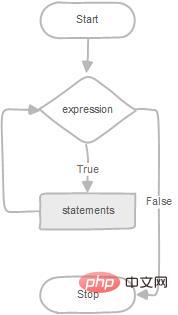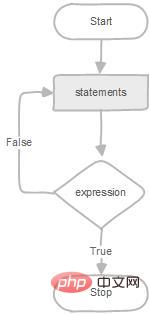Does mysql have a for loop?
Mysql does not have a for loop. MySQL does not support for loop statements. It supports three loop statements: WHILE, REPEAT and LOOP. The WHILE loop checks the expression at the beginning of each iteration; the REPEAT loop statement, also known as the post-test loop, checks the expression after executing the statement; the LOOP statement can repeatedly execute a block of code.

The operating environment of this tutorial: windows10 system, mysql version 8.0, Dell G3 computer.
Loop statements in mysql
MySQL provides loop statements that allow you to repeatedly execute a block of SQL code based on conditions.
MySQL does not support for loop statements. MySQL only supports while loops, repeat loops, and loop loops.
MySQL provides loop statements that allow you to repeatedly execute a block of SQL code based on conditions. MySQL does not support for loop statements. There are three loop statements in MySQL: WHILE, REPEAT and LOOP.
We will examine each loop statement in more detail in the following sections.
WHILE loop
WHILEThe syntax of the statement is as follows:
WHILE expression DO statements END WHILE
WHILEThe loop checks the expression at the beginning of each iteration. If expressionevaluates is TRUE, MySQL will execute the statements between WHILE and END WHILE until expressionevaluates is FALSE. WHILEThe loop is called a pretest conditional loop because it always checks the expression of a statement before executing it.
The flow chart below illustrates the WHILE loop statement:

The following is used in a stored procedure WHILEExample of loop statement:
DELIMITER $$ DROP PROCEDURE IF EXISTS test_mysql_while_loop$$ CREATE PROCEDURE test_mysql_while_loop() BEGIN DECLARE x INT; DECLARE str VARCHAR(255); SET x = 1; SET str = ''; WHILE x <p>In the above <code>test_mysql_while_loop</code> stored procedure: </p>
- First, repeatedly build the
strstring, Until the value of thexvariable is greater than5. - Then, use the SELECT statement to display the final string.
It should be noted that , if the value of the x variable is not initialized, its default value is NULL. Therefore, the condition in the WHILE loop statement will always be TRUE, and you will have an indeterminate loop, which is unpredictable.
Let’s testtest_mysql_while_loopstoredCall the stored procedure:
CALL test_mysql_while_loop();
Execute the above query statement and get the following results-
mysql> CALL test_mysql_while_loop(); +------------+ | str | +------------+ | 1,2,3,4,5, | +------------+ 1 row in set Query OK, 0 rows affected
REPEAT Loop
REPEATThe syntax of a loop statement is as follows:
REPEAT statements; UNTIL expression END REPEAT
First, MySQL executes the statement and then evaluates the evaluation expression (expression ). If an expression (expression) evaluates to FALSE, MySQL will execute the statement repeatedly until the expression evaluates to TRUE.
Because the REPEAT loop statement checks the expression (expression) after executing the statement, the REPEAT loop statement is also called a post-test loop.
The following flow chart illustrates the execution process of the REPEAT loop statement:

We can use REPEAT The loop statement rewrites the test_mysql_while_loop stored procedure, using the WHILE loop statement:
DELIMITER $$ DROP PROCEDURE IF EXISTS mysql_test_repeat_loop$$ CREATE PROCEDURE mysql_test_repeat_loop() BEGIN DECLARE x INT; DECLARE str VARCHAR(255); SET x = 1; SET str = ''; REPEAT SET str = CONCAT(str,x,','); SET x = x + 1; UNTIL x > 5 END REPEAT; SELECT str; END$$ DELIMITER ;
It should be noted that there is no semicolon in the UNTIL expression ( ;).
Execute the above query statement and get the following results-
mysql> CALL mysql_test_repeat_loop(); +------------+ | str | +------------+ | 1,2,3,4,5, | +------------+ 1 row in set Query OK, 0 rows affected
LOOP, LEAVE and ITERATE statements
There are two statements Allows you to use to control loops:
-
LEAVEstatement is used to exit the loop immediately without waiting to check the condition. The working principle of theLEAVEstatement is similar to thebreakstatement in PHP,C/C, Java and other languages. The -
ITERATEstatement allows you to skip the entire remaining code and start a new iteration. TheITERATEstatement is similar to thecontinuestatement inPHP,C/C,Java, etc.
MySQL also has a LOOP statement, which can execute a block of code repeatedly, plus the flexibility of using loop labels.
The following is an example of using the LOOP loop statement.
CREATE PROCEDURE test_mysql_loop() BEGIN DECLARE x INT; DECLARE str VARCHAR(255); SET x = 1; SET str = ''; loop_label: LOOP IF x > 10 THEN LEAVE loop_label; END IF; SET x = x + 1; IF (x mod 2) THEN ITERATE loop_label; ELSE SET str = CONCAT(str,x,','); END IF; END LOOP; SELECT str; END;
- 以上存储过程仅构造具有偶数字符串的字符串,例如
2,4,6等。 - 在
LOOP语句之前放置一个loop_label循环标签。 - 如果
x的值大于10,则由于LEAVE语句,循环被终止。 - 如果
x的值是一个奇数,ITERATE语句忽略它下面的所有内容,并开始一个新的迭代。 - 如果
x的值是偶数,则ELSE语句中的块将使用偶数构建字符串。
执行上面查询语句,得到以下结果 -
mysql> CALL test_mysql_loop(); +-------------+ | str | +-------------+ | 2,4,6,8,10, | +-------------+ 1 row in set Query OK, 0 rows affected
【相关推荐:mysql视频教程】
The above is the detailed content of Does mysql have a for loop?. For more information, please follow other related articles on the PHP Chinese website!

Hot AI Tools

Undresser.AI Undress
AI-powered app for creating realistic nude photos

AI Clothes Remover
Online AI tool for removing clothes from photos.

Undress AI Tool
Undress images for free

Clothoff.io
AI clothes remover

Video Face Swap
Swap faces in any video effortlessly with our completely free AI face swap tool!

Hot Article

Hot Tools

Notepad++7.3.1
Easy-to-use and free code editor

SublimeText3 Chinese version
Chinese version, very easy to use

Zend Studio 13.0.1
Powerful PHP integrated development environment

Dreamweaver CS6
Visual web development tools

SublimeText3 Mac version
God-level code editing software (SublimeText3)

Hot Topics
 1673
1673
 14
14
 1429
1429
 52
52
 1333
1333
 25
25
 1278
1278
 29
29
 1257
1257
 24
24
 Laravel Introduction Example
Apr 18, 2025 pm 12:45 PM
Laravel Introduction Example
Apr 18, 2025 pm 12:45 PM
Laravel is a PHP framework for easy building of web applications. It provides a range of powerful features including: Installation: Install the Laravel CLI globally with Composer and create applications in the project directory. Routing: Define the relationship between the URL and the handler in routes/web.php. View: Create a view in resources/views to render the application's interface. Database Integration: Provides out-of-the-box integration with databases such as MySQL and uses migration to create and modify tables. Model and Controller: The model represents the database entity and the controller processes HTTP requests.
 MySQL and phpMyAdmin: Core Features and Functions
Apr 22, 2025 am 12:12 AM
MySQL and phpMyAdmin: Core Features and Functions
Apr 22, 2025 am 12:12 AM
MySQL and phpMyAdmin are powerful database management tools. 1) MySQL is used to create databases and tables, and to execute DML and SQL queries. 2) phpMyAdmin provides an intuitive interface for database management, table structure management, data operations and user permission management.
 MySQL vs. Other Programming Languages: A Comparison
Apr 19, 2025 am 12:22 AM
MySQL vs. Other Programming Languages: A Comparison
Apr 19, 2025 am 12:22 AM
Compared with other programming languages, MySQL is mainly used to store and manage data, while other languages such as Python, Java, and C are used for logical processing and application development. MySQL is known for its high performance, scalability and cross-platform support, suitable for data management needs, while other languages have advantages in their respective fields such as data analytics, enterprise applications, and system programming.
 Laravel framework installation method
Apr 18, 2025 pm 12:54 PM
Laravel framework installation method
Apr 18, 2025 pm 12:54 PM
Article summary: This article provides detailed step-by-step instructions to guide readers on how to easily install the Laravel framework. Laravel is a powerful PHP framework that speeds up the development process of web applications. This tutorial covers the installation process from system requirements to configuring databases and setting up routing. By following these steps, readers can quickly and efficiently lay a solid foundation for their Laravel project.
 Explain the purpose of foreign keys in MySQL.
Apr 25, 2025 am 12:17 AM
Explain the purpose of foreign keys in MySQL.
Apr 25, 2025 am 12:17 AM
In MySQL, the function of foreign keys is to establish the relationship between tables and ensure the consistency and integrity of the data. Foreign keys maintain the effectiveness of data through reference integrity checks and cascading operations. Pay attention to performance optimization and avoid common errors when using them.
 Compare and contrast MySQL and MariaDB.
Apr 26, 2025 am 12:08 AM
Compare and contrast MySQL and MariaDB.
Apr 26, 2025 am 12:08 AM
The main difference between MySQL and MariaDB is performance, functionality and license: 1. MySQL is developed by Oracle, and MariaDB is its fork. 2. MariaDB may perform better in high load environments. 3.MariaDB provides more storage engines and functions. 4.MySQL adopts a dual license, and MariaDB is completely open source. The existing infrastructure, performance requirements, functional requirements and license costs should be taken into account when choosing.
 SQL vs. MySQL: Clarifying the Relationship Between the Two
Apr 24, 2025 am 12:02 AM
SQL vs. MySQL: Clarifying the Relationship Between the Two
Apr 24, 2025 am 12:02 AM
SQL is a standard language for managing relational databases, while MySQL is a database management system that uses SQL. SQL defines ways to interact with a database, including CRUD operations, while MySQL implements the SQL standard and provides additional features such as stored procedures and triggers.
 MySQL: The Database, phpMyAdmin: The Management Interface
Apr 29, 2025 am 12:44 AM
MySQL: The Database, phpMyAdmin: The Management Interface
Apr 29, 2025 am 12:44 AM
MySQL and phpMyAdmin can be effectively managed through the following steps: 1. Create and delete database: Just click in phpMyAdmin to complete. 2. Manage tables: You can create tables, modify structures, and add indexes. 3. Data operation: Supports inserting, updating, deleting data and executing SQL queries. 4. Import and export data: Supports SQL, CSV, XML and other formats. 5. Optimization and monitoring: Use the OPTIMIZETABLE command to optimize tables and use query analyzers and monitoring tools to solve performance problems.




